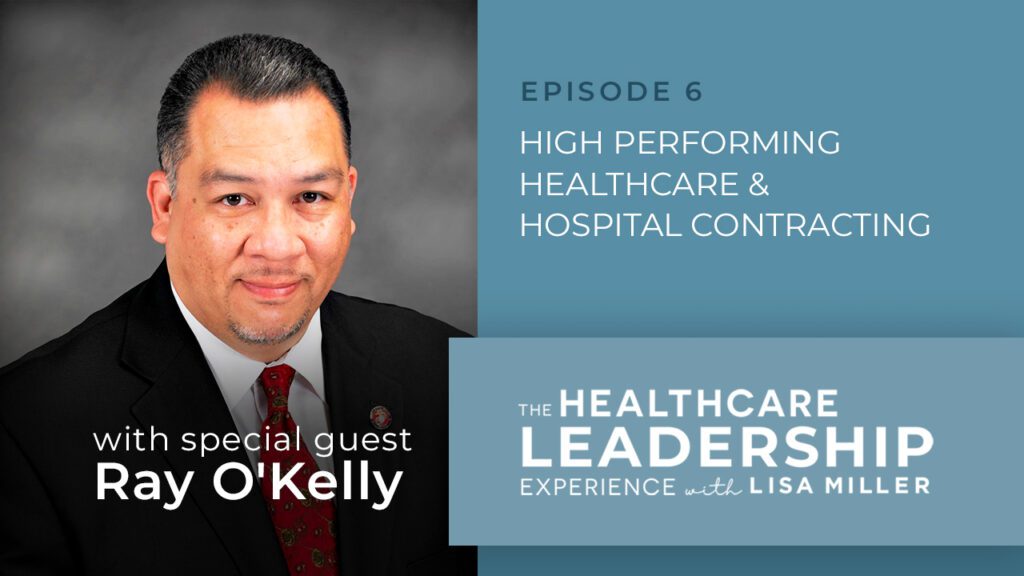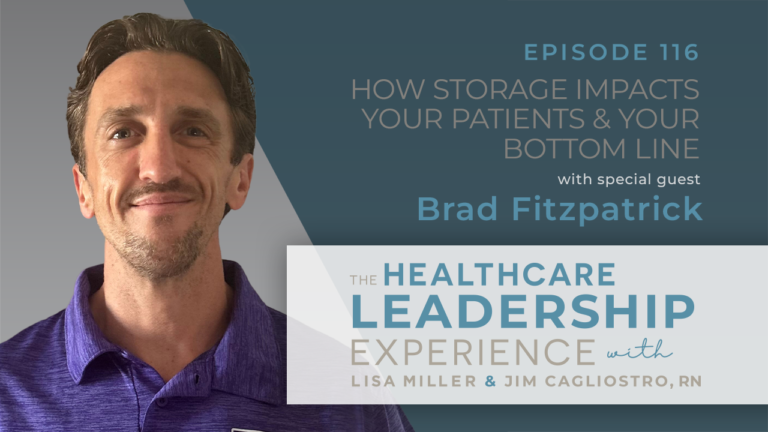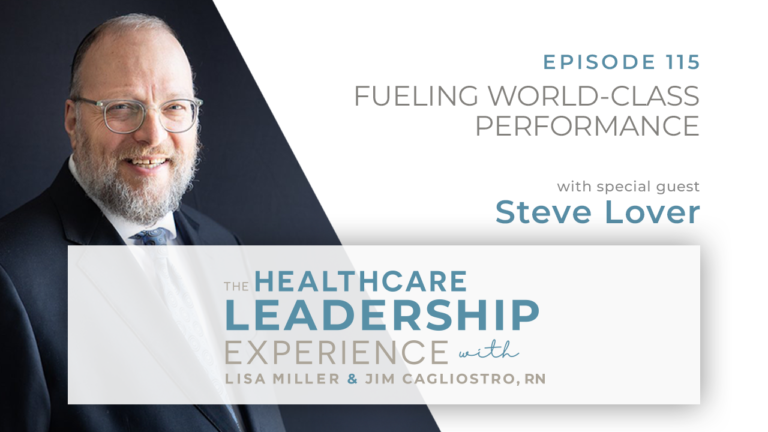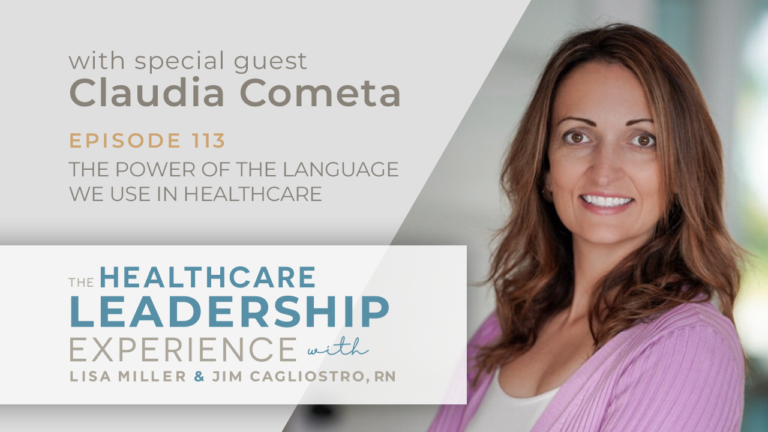In Episode 6 of The Healthcare Leadership Experience, Lisa is joined by Ray O’Kelley, CEO & Founder of Healthy Contracts and Business Data Applications (BDA), Inc. Ray has 25 years of experience in healthcare software leadership, and helped to build MediTract to a $300 million division.
Ray is a Veteran, and retired United States Marine. He served ten years of active duty during the Persian Gulf War.
Today’s episode is sponsored by Invoice ROI™, the only patented purchased services and indirect spend technology to manage, monitor and benchmark line item details.
In this episode of The Healthcare Leadership Experience you’ll hear:
- Identify the three steps to establishing the foundations of a healthy contract for hospitals and healthcare organizations.
- Discover the true definition of a contract review. (Hint: It isn’t sending a 30-page contract out to four different people and asking them to read it).
- Why the open source innovative technology behind the Healthy Contracts and BDA healthcare contract system is highly important and why it has to be the technology of today, not the past. “If you have a payer you want to reconcile, a bank of CBTs, DRGs to analyze, this technology can support it.”
- Discover the three steps to determine the renewal type of a hospital healthcare contract and when “interpretive extraction” is vital.
- Why there’s no total AI solution for contract management — and why integrity is essential. “When we look at AIs and robotics, we ask ‘’Can it make a legal interpretation?…. and 50% of the time it can’t.”
- Discover the four primary goals for working with hospitals and their contracts — and why in software as a service (SAAS) the data must be accurate and simple to use.
- Why your hospital must understand what’s really happening in your healthcare contracts. “There’s waste … but most hospitals don’t have the resources to identify, mitigate, remediate and renegotiate it.”
CLICK HERE TO DOWNLOAD THE PDF TRANSCRIPT
Resources:
🖥 https://www.healthycontracts.com
🖥 https://www.businessdataapps.com
Connect with Lisa:
🖥 https://viehealthcare.com
📱https://www.linkedin.com/in/lisamiller/
Check out this episodes sponsor:
🖥 https://viehealthcare.com/category/invoice-roi/
CLICK HERE TO OPEN THE FULL TRANSCRIPT
Lisa Miller (00:13):
All right. All right, Ray. Well, welcome to the Healthcare Leadership Experience Podcast. It’s great to have you on our show today.
Ray O’Kelly (00:22):
Good morning Lisa, how are you?
Lisa Miller (00:28):
I’m good. I’m good. Actually Ray, I’m going to do that one more time. Okay. Well, hello, Ray. Welcome to the Healthcare Leadership Podcast. We’re really excited to have you today.
Ray O’Kelly (00:42):
Good morning, Lisa. How are you?
Lisa Miller (00:45):
I’m good. I’m doing great. Thank you. I was really excited to have the show just for a number of reasons, and just to talk about a really important subject — and that’s about healthcare hospital contracting. I think it’s one of the most important discussions — the most important focus is for our hospital to talk about their contracting, because it has so many consequences and so many opportunities too. So, as everybody knows, you are the CEO and founder of BDA, and we’re real excited just to have a discussion with you about hospital contracting and your input, your thoughts, your experience about why hospital contracting is so important. So I can jump in for conversation, Ray.
Ray O’Kelly (01:36):
Thank you so much for having me, Lisa. You’re absolutely right, it was important in the beginning with Stark and ultimately false claims with anti-kickback and recruitment thrown in there for good measure, back in the early days. There has been of course some adjustments that have been made here recently, with some waivers and some changes to the regulatory. But still even today, it is still extremely important, and will continue to be in the future. You’re absolutely right.
Lisa Miller (02:12):
So I think the big question for our audience is: there’s many different contract management systems, and sometimes what happens — at least that I’ve seen — is that they are really used as more of a repository, right? Contracts put into the system, kind of checkmark, okay, we’ve done that. We’re going to talk about a couple of different aspects, but can we start there? Talk a little bit about your experience, and really the difference about Healthy Contracts and what your methodology and approaches to helping-
Ray O’Kelly (02:56):
Ours is a bit different, we have really the luxury candidly of years and years of not just contract management experience, but specifically healthcare contract lifecycle management experience. And what I mean by that is we have, if we take a look at just managing a contract — okay, paralegals and in-house counsel, they do a great job of that. But when we talk about healthcare-specific, can your vendors spell BAA? It’s a tough word because there’s also another word connected to that covered entity, and do those two things flip-flop from time to time, because you are the covered entity and the organization receiving your goods and services is the BA, or the covered entity, right?
Ray O’Kelly (03:47):
So question is, can your vendor actually talk that language? And that’s a simple single element, right? We get into multi-purpose agreements like medical director agreements, that have physician arrangements thrown into it, or potentially a little bit of real estate, little focus arrangement activity. Now you’re really talking about regulatory base risk, and that’s what we do extremely well. Just a standard repository, we’ll manage your contracts? Absolutely. But a healthcare-specific contract lifecycle management system can manage things like business associate agreements — whether you’re the covered entity or the business associate, multipurpose agreements that have elements of regulatory and high-risk from the regulatory and all those types of contracts that really become focused arrangements in the event that you have a focus arrangement environment. So it’s a little bit different, but it’s very different too, right?
Lisa Miller (04:45):
Right. Can I just ask you — I think an important question, what do you see as the areas of opportunities for hospitals? I don’t want to say that, they’re doing things wrong, but maybe there’s an area of opportunities because there’s been new changes in laws, or maybe because…I think it’s a mammoth task to really manage the whole suite of hospital contracting. So if you were to pinpoint some of those areas of say — look, these are the areas of concern the hospital needs to focus on. Maybe they don’t get as much attention as they should. Could you talk through that for our listeners about, okay, here are the things you really have to pay attention to, if you’re going to get this started and do it right — what are the things you have to pay attention to?
Ray O’Kelly (05:33):
If we take a look at really the time that we’re in, it’s challenging — it’s challenging in a number of different ways, we are cognizant of that. We asked ourselves some questions relative directly to that, because that’s the issue of right now. And that is, how can we affect what’s going on today with our hospitals? I don’t have a mask on this very moment, but I will when I leave this room, and so will everybody else.
Lisa Miller (05:56):
So will I.
Ray O’Kelly (05:59):
And because of that, we have to ask ourselves a question, can we affect that? And so we dug hard. Here’s what we know to be true, healthcare organizations, whether they’re hospitals or non-acute care, post-acute care, have contracts that probably are not being looked at too much. It’s tough. It’s a hard time. Organizations like VIE Consulting have the ability to help identify those as opportunities to reduce spend, identify waste potentially.
Ray O’Kelly (06:32):
And then you have this other group of contracts that aren’t currently active, that are expired, that have the ability to be looked at, compared to accounts payable, looked at from an assessment perspective and ask ourselves the questions as the stakeholders internally of our provider organizations, “are goods and services still being rendered?”. And if the answer is no, that’s immediate waste reduction, and we can help with that. Folks at VIE Consulting can do that as you well know, from a very active perspective, right?
Ray O’Kelly (07:08):
Identifying which one of those and how to go after those, we don’t do that. We can help identify 1) what they are. 2) we can send out assessments to the stakeholders to determine if goods and services are still being rendered, and if that contract is still active, and then 3), once you’ve identified gap, remediate and memorialize all of that data inside of this contract lifecycle management system, we call Healthy Contracts and possibly reduce costs, possibly terminate formally, possibly amend, renegotiate — all those things we know to be true when we have to do things normally, on a periodic basis, for instance, for joint commission, accredited healthcare organizations that have to worry about that little leadership directive, 04309 potentially, or DMVs facsimile of periodic reviews of these contracts.
Ray O’Kelly (08:03):
That’s some of the stuff that we can do as it relates directly to the times and what the most heavy needs of the health organizations are today.
Lisa Miller (08:13):
I think that’s a great for our listeners to hear those areas of focus. There’s a lot of sensitive agreements, agreements that have a higher scrutiny. And what I love about what you’re doing at Healthy Contracts and BDA, is that you’re bringing that risk to the forefront. And you’re helping hospitals address that risk, and you’re helping hospitals say, okay, these are the things that have to get done. And I’m a big believer in these annual reviews, because if things go on too long, those are where the problems really start happening.
Ray O’Kelly (08:54):
You’ve hit the nail on the head. And one of the other things, and this goes back to the old days, that are still kind of being used out there, what does a contract review really mean? Does that mean, do I send the entire 30-page agreement out to four different people and say, please review this contract, because officially not to contract review. Now the question becomes, how effective is that? How much information, how productive is that exercise? And so what we’ve been told by healthcare is, it sure would be nice if I could send the insurance provision requirements or cyber or whatever the case is, out to my insurance folks, send the pricing out to my financial, my stakeholders, send my warranty indemnification over to my legal guys that are experts in that field, or any other area of that contract, but not the whole 45-page contract with amendments, addenda, attachments and potentially the BAA that’s on the end of it, right. That’s embedded.
Ray O’Kelly (09:58):
So what we say is, you don’t have to. Number one, we manage provisions in the contract individually. We provide the association for healthcare risk management standards to it, on an impact and scoring process, five-by-five letter. And then we have the ability to say, Mr. Insurance Expert, take a look at this insurance provision on this existing contract, take a look at this provision on this draft agreement, or take a look at our template and tell us if we’re right on our template before we actually start using it as a provision. Now you can take a look at the entire contract and try to put it in context if you need to, but this one provision specifically for insurance purposes, typically stands alone, and pricing typically stands alone, unless there are elements within that contract, but that’s for folks like you and the great people of VIE Healthcare Consulting to say, this is what you need to do with this great tool, right?
Ray O’Kelly (11:08):
But what we’re saying is, once you get this contract provision, Mr. Insurance Specialist, let’s put a risk score on it, a financial, operational, legal risk score on it. And then let’s aggregate all of these provisions by all these experts that have risk scored these provisions, into a risk score so we can make a truly informed decision on this vendor, this contract, this pricing, this service, and where we’re at as a business.
Ray O’Kelly (11:39):
And by the way, we’re there as a business, my goodness, has anybody ever done a risk score on a vendor? I suggest doing it. We don’t do that for a living, the great folks of VIE Healthcare Consulting know this business cold and they can you with that, I know Lisa knows that because you’re the CEO and founder there, but the key here is having the tools, knowing what those tools need to be before they get deployed. Instead of somebody saying to me, which I’ve heard before a lot over the last 12 years in the business, when I was at MediTract, “It sure would be nice if,” I’ve heard that hundreds and thousands of times, “It sure would be nice if,” so we took, “It sure would be nice,” and we turned that into Healthy Contracts. It’s all the things that you were telling us would be nice if you could have, we have that now.
Lisa Miller (12:33):
So wait, I love this methodology and what you just talked about was, what does a contract review really mean? And I wonder, you sent that to 50 people, or 50 households, what definitions you would get back, right? But it’s so powerful, it’s just something that somebody should be thinking about, and the risk score is very unique to you and your methodology, what you created in terms of taking out those sections, it was provisioned and giving them to the experts, right?
Lisa Miller (13:04):
I shouldn’t be looking and reviewing an insurance provision, and for that matter, probably most people shouldn’t, but an expert should be looking at that, there’s nuances, wording nuances, everybody who listens to this podcast knows that they reviewed a contract, sometimes a small word makes a difference. And I think that’s a really important conversation, that you are able to take those provisions out and send those to the experts versus having a 50, 60, 70 page document to review.
Lisa Miller (13:36):
I do agree that there should be kind of somebody looking from A to Z and there’s this flow of a contract review that’s important, but I think we skim through some of those sections and we should be pushing those out to insurance experts, internal compliance. Also finance, finance should be saying every year, this contract has an audit provision.
Ray O’Kelly (14:02):
That’s right.
Lisa Miller (14:05):
And I think what you’re doing is, I don’t say this lightly, but it’s a game changer. That’s why I wanted to have this discussion with you, because it is this next level, this really significant jump in helping hospitals manage their contracts, giving them that, like you said, “it would be great if” — but you put this together and you’re really supporting hospitals, giving them what they need in order to manage their contracts.
Ray O’Kelly (14:34):
No, thank you so much for the compliments, they’re greatly, greatly appreciated. What I would also add to that, and what you said is 100% absolutely right on target. What I love to add to that is, we don’t dictate which order or what that process looks like. We rely on experts in process, like yourselves, like VIE Consulting. We don’t go out telling folks, here’s what you got to do, and we’re going to create a system that makes you do it, and if you don’t do it, it’s broken and you’re going to put in a help desk. We don’t do that. We leave options available in our system so that you have the ability to make a decision or go a different route. It’s what we call flexible workflow, flexible contracts management.
Ray O’Kelly (15:29):
So in other words, you may want to do a risk score on a provision, you may want to send out an assessment for a force majeure. You may want to just take a look at all of the cyber insurance provisions for each and every one of your contracts by clicking onto our provisions tab and searching for force majeure, or cyber insurance. So we give you the ability to look at these from many different angles, with many different options on how to really review, identify gap, right? Based on the expertise that is either in your organization or that you need to bring in from a consulting perspective.
Ray O’Kelly (16:12):
Our goal is not to tell folks what to do. Our folks is to give you enough tools so that when you make a decision or when you’re giving or getting advice from credible sources like VIE Consulting, when you get those opinions, and that advice, and those recommendations and guides, that you actually have a system that can do many things, and it’s not just 1) a contract management system, 2) it’s not a very rigid system of workflow or process, super-important. And 3) probably most importantly, you don’t want this thing to cost an arm and a leg to, one, deploy, and two, manage. That’s one of the other areas that we really truly can help in. Our system is built on AWS. We pass these cost savings onto our clients. If you’re having trouble out there, if you’re listening to me, I’ll speak directly to your audience.
Lisa Miller (17:11):
Please.
Ray O’Kelly (17:12):
If you’re listening to me and your organization needs to reduce your costs, give us a holler, we can do it, we’ve already done it, we know how to do this, we’ve got the expertise to migrate you over, but if you really need to make some money appear or reduce some costs, or if you’ve been asked to cut your budgets and cut your spending, we can help you do that.
Lisa Miller (17:35):
Thank you Ray. You’ve got a lot of raving fans from hospitals who love the … There’s a couple of things, they love the performance, is lightning fast. They love the onboarding. Obviously they’ve had to all switch from change over from another system, which I think it almost paralyzes everyone to say, “Oh, I’ve got to switch.” And I think that’s a hurdle, but from what I understand from your hospitals using your system, because your technology is so advanced, you make that process just absolutely seamless. And it’s not just in words, it’s truly indeed you really are able to do this because you’ve utilized what you and I have spoken about before, which is this opensource technology that is the technology of today, not the technology of the past. So can you speak to a little bit of your technology again?
Lisa Miller (18:30):
I just want to take a step back one moment before you say that, one of the purpose of this show is to give our listeners, whether it’s cost-savings opportunities, leadership revenue improvement opportunities, process improvement, ways to do things better, bringing onto our show new innovations. I consider you, and innovation, are a critically important area for our hospitals. So that’s why I want to talk about your technology, if you would share why someone would think, really this technology behind the contract management system, and I think that’s important.
Ray O’Kelly (19:10):
A little bit of history. I think it’ll help put it in context. Back in the early days, late 90s, when really Stark hits, the Stark law hit and the requirement to manage these position agreements, and their relationships with hospitals, that’s where it kind of started. That’s where we were born, MediTract was born. So most organizations came after that, candidly. The healthcare specifics came after that. So when we started, we used the best technology available. It was the best technology available, and it worked. We delivered upon our promise. And by the way, I loved working with all of your listeners, because most of you know me, most of you I’ve met with personally, and I loved it.
Ray O’Kelly (20:06):
What I didn’t love was our inability to be flexible in our services offering, we just couldn’t, we didn’t have the ability to, because of the technology of the day, which was a piece of software sitting in a data center, a physical data center subject to SOC 1 audits, and physical and electronic intrusions, high cost. You guys paid the price and probably still are candidly. And the ability for that somewhat rigid system to change with the regulatory requirements, it didn’t exist. And so, I think this is my way of saying, we did the best we could with what we had. Things evolved.
Ray O’Kelly (20:55):
So with that technology wave, came the ability for us to do a number of things, and you see it with Healthy Contracts. It gave us the ability to turn on a dime,. And by the way, I’ll give you an example. One of our clients said, “Hey, Ray, can you guys take our managed care agreements, we’ve got a few for skilled nursing. We’ve got maybe 50 codes that we want you to pull some inclusion, some exclusions, some rate structures, and some carve-outs — can you put those into a table in your system so we can look at them and by the way, run a report with all of that data in it, so we can compare one payer’s reimbursement rate to another payer’s reimbursement rate for the same code?” And the answer was, “I don’t know, let’s take a look.”
Ray O’Kelly (21:49):
So we took a look and we said, “Yeah, we can do that, pretty easy.” So a couple of weeks later, we put data tables in place, and we started extracting managed care agreement data out of managed care agreements for payers, and we’re giving this particular skilled nursing organization the ability to compare their codes, their reimbursement rates by facility, by payer, to determine who’s got a problem here, which one of these payers is not treating us, right? So we can do that on a dime. The old days, couldn’t do it.
Lisa Miller (22:23):
I have to jump in on this. This is spectacular. So I want everyone to understand that nuance in this, because we’re hearing a lot of people say, “Oh, I can scrape your contract. I can scrape your contract and get you the information.” I hear that And I go hmm. I’m familiar with scraping tools and you don’t get structured data, it’s not what a hospital needs to perform a contract review these days. And so what you’ve done is you’ve said, take that table, we’re going to build that into our contract management system so it’s replicable, it’s comparable-
Ray O’Kelly (23:15):
It’s variable.
Lisa Miller (23:18):
Right, it’s variable.
Ray O’Kelly (23:19):
It’s variable as well, right?
Lisa Miller (23:21):
Yes. And that is such an enormous value. You’ve got so many values. I think for that aspect, it’s remarkable. And so the rate tables, you are able to put into your system and they could be analyzed, it could be looked at easily, it’s not a PDF that someone has to go through, right?
Ray O’Kelly (23:46):
Well, here’s what I will tell you, if you know much about payer agreements, and I know anybody out there who’s a charge master in hospital or anybody out there who has worked with these payer agreements, these are crazy, crazy complex documents.
Lisa Miller (24:02):
They are. They can change from in-patient to outpatient to carve-outs, absolutely.
Ray O’Kelly (24:08):
They could be percentages of something else that you have to go somewhere else. So I want to make myself very clear. We are not, nor will we ever, have the ability to do what organizations do on AI-based pricing transparency, that’s a whole different matter. I’m not sure how they’re going to do that, candidly. Here’s what we can do though, if you have a payer that you want to reconcile, or if you have a bank of CBTs, or DRGs that you want to put into a table and analyze, we can help with that.
Ray O’Kelly (24:49):
If they are tough to come by, because AI, scraping, auto extraction with robots, all the other stuff that are available out there, still can’t do it because I’ve been around for a long time, I still have not seen a company that can take a true rate table out of a payer agreement that sideways in a contract, read the columns, make sense of the rates and the codes and the descriptions of those, and refer it over to a second source in order to determine what percentage of that second source this rate actually is.
Ray O’Kelly (25:28):
That’s why we have incredible folks in healthcare organizations like charge masters, paralegals, contract specialists, like contract and payer pricing specialists. Those are the folks who can look at that and make sense of it. I can’t even make sense of it most of the time. VIE Consulting can make sense of it, KPMG can make sense of it. I can’t. And I promise you that robotic systems and AI, they also cannot. That’s not something that’s possible right now. The human mind and its ability to interpret, but also form opinion, and these are what I call interpretive extractions.
Lisa Miller (26:09):
Right. I like that.
Ray O’Kelly (26:10):
Right? I’m not sure if I’ve coined that phrase, but I refer to it as that, I’ve never heard anybody else tell me that, but here’s another interpretive extraction of a contract that you know to be true, as well as all the other paralegals out there. What’s the renewal type on this contract? What’s involved in determining the renewal type of a contract? 1) It’s a provision in term, 2) It could be in the termination clause, right? And, 3) Are there additional provisions that need to be considered when developing that renewal type?
Ray O’Kelly (26:47):
Here’s an easy one. This contract will renew for successive one-year terms unless otherwise terminated. We all love that term. If it’s something other than that, we have to interpret it, and systems candidly, I mean, I just chose the easiest one there is, renewal time, but let’s talk about what’s the renewal date. What’s the expiration date? What is the effective date? Unless it’s specifically written effective date of this, is the signature, is it the date on the preamble — where is that effective date? That’s where people come into play.
Lisa Miller (27:26):
Right. Are there conditions that have to be met, even in addition to that date, right? There are conditions.
Ray O’Kelly (27:33):
That’s right. So, one of our folks that I absolutely love, her name is Sarah Jackson, she’s our Senior Vice President of Implementation Services, she’s a paralegal, she’s been working as a paralegal for 25 years, was with 21st Century Oncology, and kind of ran their show. But one of the things that we’ve always talked about, she and I, when we’re looking at these AIs and these robotics and these machine learnings is, can it make a legal interpretation, can it decide based on a legal understanding of a contract, what something is based on the interpretation of the law?
Lisa Miller (28:17):
Or even the spirit of how they wrote it.
Ray O’Kelly (28:22):
Or the spirit of how they wrote it. Yeah. And the answer about 50% of the time is it can’t, it can’t. So we have to do interpretive extraction and we need to pull that data into these contracts in a manual way. Sometimes we can pull it in with robotics and AI and machine learning, but there will never be a time where we can replace folks with robotics and machine learning.
Lisa Miller (28:52):
I love your honesty, because I’ll speak in a moment. We have a patented technology that extracts invoice line-item details from purchase services. And that can be done exactly like we’re talking about. It’s a technology that takes those line-item details from the invoice, it comes out, it’s programmed and coded, and it’s a patented process.
Lisa Miller (29:17):
And we can reconcile the terms of the agreement. Now that part of taking those terms out of the agreement is manual, right? We’ve got to manually seek it, what was the spirit, everything, and then we program that into the technology. And I always say it, that’s the manual part of it. We have created that technology to take those lines of details from the invoices. But I love that you’re so honest about saying that you are not full AI, and we hear this like always, “We’ve got a complete AI solution,” but what we find out is, there is a manual aspect, or it’s a lot of a manual aspect. And I love the way you were talking about our field, or industry right now to say, yes, you can take that data, the tables, you can create those, but you’re not making these promises to say that, you have a full AI solution that can think for somebody, which you need experts.
Ray O’Kelly (30:23):
And I’ll apologize in advance. I spent 10 years in the Marine Corps, and in the Marine Corps, integrity is something that you have to have. I got brainwashed by those horrible, horrible people. And now I wake up early in the morning and I can’t help but tell the truth. And that’s a backward explanation of, boy if you can’t tell the truth, why speak? We went a very long time after 2012, with MediTract having to worry about that. I don’t want to have to worry about that anymore. The AI, all of those things that are being touted as buzzwords, as heavy marketing hits on LinkedIn and on … We’re not interested. Here’s what we’re interested in. When you sign a contract with us, for our services and for our solution, the contract has all the elements of your implementation in it before you actually start work with us, that’s an integrity piece.
Ray O’Kelly (31:32):
Nobody else does that by the way. If there are additional outlier services that you need us to perform, they are detailed in the contract to the letter. Nobody else does that by the way. Second, once that happens, the day after you receive usernames and logins, the day after you sign your contract with us, and you begin using the system after some training, nobody else does that. Why? Because they want to stretch out this process of implementation so that you’re relying upon them for consulting services, not consulting from a post-implementation, but consulting services from a, “Oh, and by the way, are there some other things you want us to do?” “Oh, more money.” Not part of the scope of work, we don’t do that. That’s wrong.
Ray O’Kelly (32:25):
So what we do is we sign a contract, we start implementation services. But the day after that, the day after you signed with us, you get usernames, passwords and training so that you can start using the system to add your contract. So that big backlog that you had during the first implementation, because it took three years, 6 or 12 months to get all your classifications in, to get all of your attachments ready, to get everything organized, and then the process of actually bringing it in and doing the QA, and then the try 6, 7, 8 months later, and now you’re starting to pay for it. And you’re still not able to use it because the workflow doesn’t really work all that well. And it’s not what you asked for, because you didn’t do a scope of work. No. What we say is, if you want to go now, let’s go now. We provide you with preloaded classifications that you can adjust later, but you can go now and you have the ability to use the system today.
Lisa Miller (33:28):
And I love that. And as we wrap up, I wanted our listeners, we might have some viewers later, but basically our listeners, to hear your story, because I think it’s a really important story. You have talked about four primary goals in how you work and with hospitals and their contracts. It’s performance must be lightning fast, The data must be hyperactive. User experience must be simple and easy to use and costs to our clients absolutely must be affordable and less costly than their current legacy systems.
Lisa Miller (34:03):
And so I wanted everyone to hear this because hospital contracting is foundational for financial success, it is. And there’s also risk issues, there’s protection issues, and so I wanted to speak with you and really primarily about what you’re doing in the marketplace, because I want people to know that there’s a different solution, a different way that they can operate, that actually helps them. I mean, it’s not a burden. From our conversations, you take that burden, and then you’re giving your hospitals so much value and so much a better way to help them with their contracting, which really they need, they need for all different reasons. Again, financial, process, risk. And you’re giving them an innovative solution that they need. So I was excited even to have this conversation,
Ray O’Kelly (35:01):
Let me give also some credit where credit’s due, it’s super important to me. In the early days of my career, I was mentored by two guys primarily, arguably three, Scott Jeffrey, who’s there in New York by the way, New Jersey, as well as Tom Resk, and George Brown, these are three guys that kind of where the immediate leadership When I was at MediTract and Track manager, Tom Resk and Scott Jeffrey, Tom was the Chairman and CEO, Scott Jeffrey was the President and Chief Operating Officer. They would always say: guys, we have to learn this lesson in software, especially in service, software as a service, it has to be fast, the data must be accurate and it must be simple to use. If you miss those, it’s not going to work. People are going to go, people are going to leave, people are going to say, it’s too complex. I don’t have a PhD in your software.
Ray O’Kelly (36:01):
If the data’s not accurate, they’re going to say this isn’t accurate, I can’t use this. And my goodness, if it’s too slow, people are just going to turn it off or go off to another system or say, it’s busted. They instilled those three primary elements of what we try to accomplish, has to be fast, has to be easy, it has to be accurate. We’ve expanded upon those because of the time. It also must be affordable and you must be able to reduce costs with it. So there’s a fourth there that we’ve added on. And I want to tell Scott Jeffrey and George Brown and Tom Resk hello, but also thank you, because those are the guys who really created MediTract in its greatest degree, they really did.
Lisa Miller (36:47):
I appreciate that. That’s great. Thank you. Thank you Ray. And I just want to leave with two final thoughts. One is just to tell everybody, one thing that maybe they can do right now that would be impactful for whatever they’re doing now with their contracts, is there something that you just give a bit of advice to everyone, as we’re starting 2021, as they’re thinking about organizing their contract, we hear a lot about, “Oh, the contracts are in the draw still,” or “We don’t have them,” or maybe it’s more specific to the risk areas that you talk about — but can you give our listeners just one piece of advice that they can take away right now and maybe start easily this month or January?
Ray O’Kelly (37:39):
Yeah. I would say primarily, and again, this is not a rehearsed conversation, nor is the content preloaded. Here’s what I will say to you. I think most people in my position would say, give us a call, give Healthy Contracts … That’s not what I’m saying to you. If you are in good shape right now, and you’ve got other priorities, focus on those other priorities, because there are a lot of them, that’s one. Two, if you do have some requirements, or if you do believe you need some help with your contracting, whether it’s purchased services, managed care agreements, physician, whatever they are, give some qualified folks a call like VIE Consulting. VIE Consulting would be able to tell you and do some gap identification and provide you with some remediation, which could or could not include Healthy Contracts, right?
Ray O’Kelly (38:39):
Maybe we’re not the people for you. Maybe I’m not the right guy for you. Maybe our organization didn’t listen to all those things that we learned all those years in an effective enough way. But I’d like the ability to earn that opinion from you. But my first step, if I was running a healthcare organization would be to have some folks come in, take a look at our contracting process, our systems, our sources, our reviews and the efficacy of pricing and payable as it relates to goods and services and cost structures — and all the things that a good credible consulting organization does, at a good price, important.
Ray O’Kelly (39:30):
And be informed, because if you’re not informed, you can’t call me, not really. You can’t call Healthy Contracts and say, I don’t know what we’re doing, I don’t know where we’re at, and I don’t know where we’re going, but I want you to come help us. That’s a trip I’m not sure we want to take. VIE Consulting is much more of a navigation. Consulting organizations like VIE Healthcare Consulting are navigators that can really help guide and show you the way to solutions like ours, if necessary. And that’s what I would really, really love for folks to do. Just get informed about what’s going on in your healthcare contracting.
Lisa Miller (40:08):
So I just want to recap, because I think that’s super important. So you’re just saying, understand the truth about what’s going on in your organization. Sometimes we assume we have a contract management system Lisa, we got it, no, we have a department, we have risks, we have it, we have procurement, we got it. And so, it gives us a false sense of security, I think.
Ray O’Kelly (40:31):
It does, it does.
Lisa Miller (40:31):
It’s an interesting thought about how many times we do have this false sense of security about our operations, and so what you’re saying is, find out really what’s going on, right?
Ray O’Kelly (40:44):
And Lisa, organizations that have risk departments, internal audit, they’re stretched, their resources are super….
Lisa Miller (40:55):
Absolutely.
Ray O’Kelly (40:56):
So having the ability to identify high risk in contracting, I’m not sure it’s on a high priority today. However, high risk in contracting costs and spend reduction, I’m guessing that’s right up there, because of what’s going on today. Organizations with the risk and internal audit, they’ve got to prioritize. Then there’s folks that just don’t have the ability to, the FQHCs of the world, the community health centers of the world, the rural hospitals that I love. I’ve been in the middle of Nebraska, calling on 10-bed hospitals and meeting with them to see about their contracts.
Lisa Miller (41:41):
I have been in 10-bed hospitals in rural California, and I’m with you. And they need these insights and they need …
Ray O’Kelly (41:52):
Absolutely. So it’s not just the big guys out there with 50 employees, risk organizations who are really attached to each one of the functional risk areas of the organization. It’s really also the rural hospitals out there who don’t have the resources, it’s for the medical centers, the memorials and the community health centers that are barely hanging on. There’s waste, I know there’s waste, you just don’t have the resources to identify it, to mitigate it, or to remediate it and renegotiate. I think that’s where VIE Healthcare consultant can help you possibly utilize some tools and Healthy Contracts.
Lisa Miller (42:35):
I just think contracting leads to a lot of opportunities. I think that, that’s the road. I mean, I speak a lot about, do you have high-performing contracts? And so that’s why this conversation is so important because contracting leads to so many margin-improvement opportunities or risk mitigation opportunities. We don’t want to go back and do failure work, as we have to find out four or five years later, things weren’t done right, as opposed to having a process to capture opportunities in real-time utilizing a system. See, what I love about Healthy Contracts is that you have a system that people want to use, it’s easy to use, that is giving these tables, that’s helping reduce the resources. So you’re giving them a greater likelihood to utilize the contract management system that’s needed.
Lisa Miller (43:30):
And that’s what I love. And I think my message for today is, if you have a contract management system, it’s so important to utilize it, just like you said, find out where that gap is. And you and I, and I’m just going to say, as people know me as well, we have no financial relationship, we’re independent of one another. I think it’s important, but I just love what you were doing, it’s spectacular, I wanted everyone to know, because it’s important for hospitals to be able to know about new up and coming, not even up and coming, but technology that hospitals are using, they’re making a difference and we need difference makers in healthcare.
Lisa Miller (44:16):
And so I applaud you for taking everything that you’ve learned and now making it better to help an industry that needs help. So I thank you so much for the work you’re doing. Can you tell everybody where they can get a hold of you, or they want to look you up?
Ray O’Kelly (44:35):
Well, if it’s okay I’d love to say something to the real heroes out there. My wife is a registered nurse, and at this time, all the nurses, NPs, CNAs doctors and all the folks who work in healthcare who are caring for us and really taking care of us, you’re my heroes. And I want you to know that, and I want to say that to you personally. Thank you.
Ray O’Kelly (45:01):
I get to thank my wife every day for doing it. But I’ll thank the rest of you via this podcast for being there for us and taking care of us. It’s important. I’d like to say just call Lisa as far as contacting Healthy Contract, that’s not the right way. Go to our website, either www.healthycontracts.com, you can hit us on LinkedIn as well. I believe there’s a Facebook, I don’t do all that stuff, but the LinkedIn I pay attention to. So if you’d like to come talk to us, come talk to us virtually, or if you’d like to send us an email, all that contact information is on our website as well.
Lisa Miller (45:44):
Great. Great, thank you very much. This was a fantastic, informative show, and I am looking forward to hearing all the great things you’re going to be doing next year. I’d love to have you back on but thank you for spending time with me today.
Ray O’Kelly (46:00):
Thank you, Lisa.











